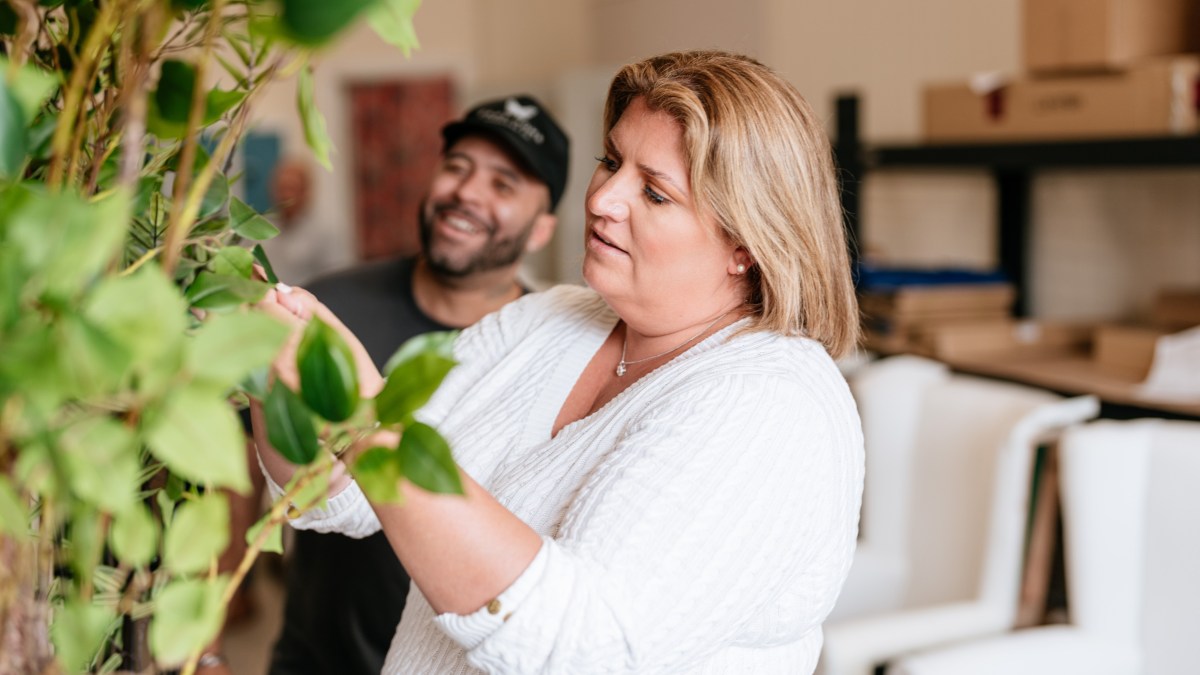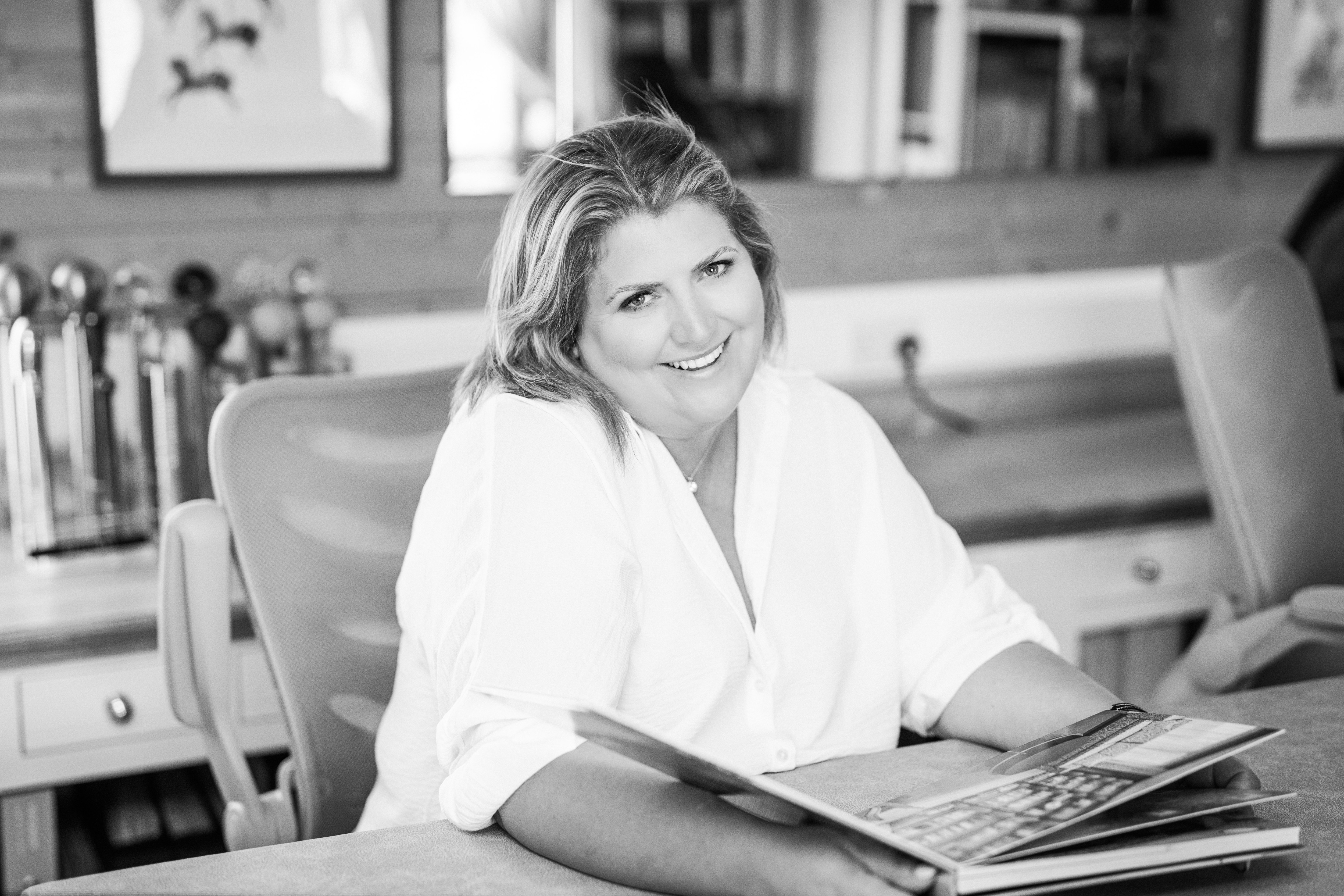AAs an interior designer, Kerry Southern-Reason helped redesign the homes of celebrities and footballers and partied with pop stars such as Lulu, Donny Osmond and members of boy band Blue. She also served as a consultant on television shows including 60 minute makeover And Britain's ugliest roomsand once she was flown to meetings in a company helicopter.
But she left the glitz and glamor behind after her grandmother Joan Stone went into a nursing home in 2016. “It was the most disgusting place I had ever seen and it cost at least £1,400 a week,” recalls Southern-Grund. “I remember walking in there and the nurse showing me the only room they had left, which was green. I said to her, “My grandma hates green.” The nurse said, “It doesn’t matter; She has dementia.' ”
The exchange spurred Southern-Reason, 45, into action and she now designs and renovates homes through her company, Care Home Interiors, which she founded in 2017. It's a neglected area in interior design but one that can have the biggest impact, she said.
The correct design of a nursing home has a major impact on the quality of life of its residents. “They serve no purpose if residents cannot navigate the world around them,” Southern-Reason said, citing the example of a recent project. “When we walked in it had white walls, a red floor and blue furniture. That was it. The residents climbed the walls. They were screaming and aggressive, it was terrible – like a psychiatric ward.
“We made it a home… and the screaming stopped. The whole atmosphere dissipated.”
One of the challenges of her work is balancing the need for clinical functionality with the creation of a comfortable, homelike atmosphere. This is even more important for people with dementia, for whom a hospital-like environment can increase feelings of confusion and anxiety, Southern-Reason explained.
Her team, alongside architects and mechanical engineers, are involved in a project from the start, with a new care home costing “between £15m and £20m” to build. “To make it look nice, we make the ceiling plans and then we have to talk to him [engineers] As for the sprinklers, do they provide proper coverage in the event of a fire?
Southern-Reason's Care Home Interiors had sales of £3.5 million last year
NURSING HOME INTERIOR GROUP
“People think that interior design is just about choosing colors and fabrics, but that's not the case. It’s so complicated in an environment like this.”
Southern-Reason and her partners, husband William and production manager Simon Martin, employ 45 people at the company's headquarters in Hampshire. Care home customers include Porthaven, Tanglewood, Macc Care and Coate Water Care. They contributed to sales of £3.5m last year, resulting in pre-tax profits of £270,000.
• In AI Care Home: The smart technology that makes old people safer
Most staff work in manufacturing the home furnishings – from cushions and curtains to upholstered furniture – that Care Home Interiors uses, with some larger items sourced from overseas. The company even makes “photo furniture,” where pillows, lamps, and chair covers feature photos of family members and pets. The idea came from Southern-Reason's experience living in a hospice with her mother, Penny, for the last few weeks. “When my mother was dying, she stared at the back of a chair for about a week. I don’t want anyone’s last memory to be of the back of a chair.”
Her mother was the inspiration for the company in more ways than one. A talented seamstress, Penny had made curtains when her daughter was young to supplement the family income and pay her school fees.
• Nursing homes warn of closures as tax rises push them to a 'tipping point'
She had been sent to a private convent school in Hampshire after being “terribly unhappy” and “failing in the state system”, mainly due to hearing problems caused by bacterial meningitis as a child, along with undiagnosed attention deficit hyperactivity disorder ( ADHD). ) and dyslexia. To cover the fees, her parents worked seven days a week. Chris, her father, was a building contractor and his parents ran market stalls selling fabrics – and Penny's curtains.
Since money was tight, they advised her to pursue a career as a lawyer or an accountant. “'After that, your life is your own…you always have something to fall back on,'” Southern-Reason recalled her mother telling her. So she trained properly and qualified as a chartered accountant, working for several small practices while also helping care for her mother, who had been battling gynecological cancer before Southern-Reason was born.
In between chemotherapy treatments, Penny desperately wanted to work, but found it difficult to find a job. So the family set up a business making and fitting curtains, which eventually grew to employ 20 people and had an annual turnover of around £500,000. Southern-Reason also kept her job as an accountant – until a chance meeting with television presenter Anthea Turner in the early 2000s set her life on a new path.
Turner's then-husband, Grant Bovey, asked Southern-Reason if she would like to help him start a new company, Imagine Furnishings, to furnish newly built homes as he expanded his rental real estate empire. For a while, life was good: she lived side by side with the rich and famous and lived “in a world I could never have imagined.” But the financial crisis in 2008 caused the real estate market to collapse – and with it Bovey's business. His Imagine Homes empire, which included Imagine Furnishings, collapsed with debts of £50 million.
Southern-Reason started again in 2008 by starting her own company, Vivid Living, to sell furniture packages for homes. “On average it would be around £6,000 and that would buy you a pair of curtains, a sofa, a chair, a coffee table, a TV, a lamp, a table, a wardrobe, a chest of drawers and bedside tables,” she said.
She was also busy renovating celebrity homes and serving as a consultant for television shows, but after nearly a decade at Vivid Living, Southern-Reason had her aha moment about nursing homes and dedicated herself to working on them. A resident in his 80s cried when he saw his newly renovated room. “He said, 'I never thought I'd live somewhere like this.' That was the moment I decided this was what I wanted to do.”
As if she wasn't busy enough, Southern-Reason has just invested £250,000 of her savings into opening stables to help people with post-traumatic stress disorder, anxiety and dementia through interactions with horses. Southern-Reason has two teenage children, both of whom are neurodiverse.
She said she does best when she's busy, which is partly because of her own ADHD. “It's actually unhealthy for me to only have one thing to do. If that's all I have, I'm constantly fiddling with it. It’s much better for my company if I can think about other things too.”
High five
My hero… Kit Kemp, Founder and Creative Director of Firmdale Hotels. I love her style and what she has created with the hotels. When I visit one of them, I feel like a different person in a different world.
My best decision… I started a business to employ my mother and father, and then they could retire at 50. They gave me everything, so it was the least I could do.
My worst decision… doesn't take care of myself. I only sleep three hours a day; I'm constantly working. I would probably perform better if I were a little kinder to myself.
Funniest moment… I started a TikTok channel last year that quickly grew to 17,500 followers. I am now invited to events as an “influencer” and signed by a modeling agency. I went from being this serious CEO to being a TikTokker. It's hilarious.
Best business tip… is to never give up. Running a business is hard, harder than you can imagine. But if you keep trying, it will work in the end.

